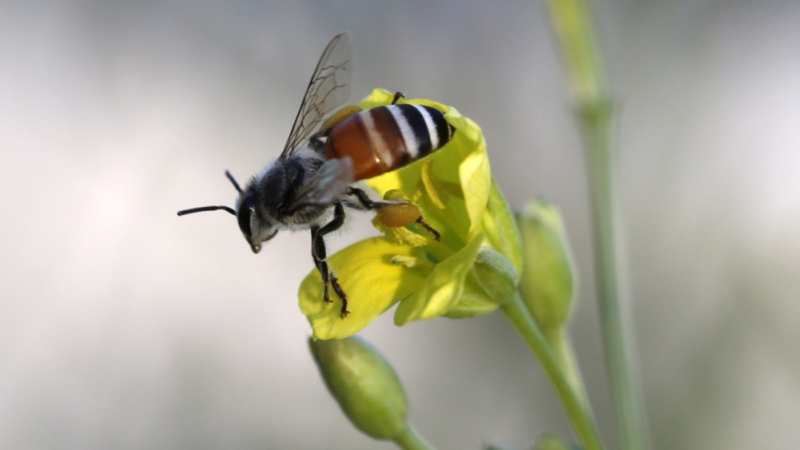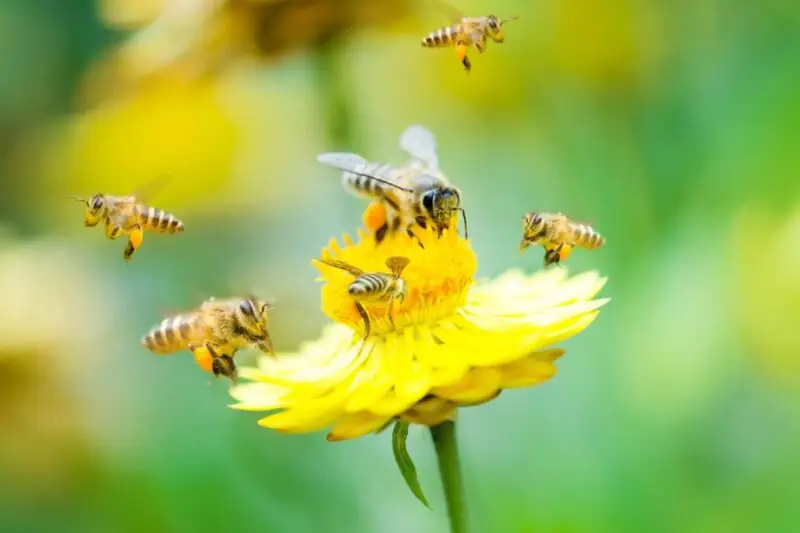Understanding the Importance of Pollinators in Bee Pollination: Why are Pollinators Important?

Welcome to a deep dive into the intricate and captivating world of pollinators. “Why are pollinators important?” – you may ask. Their significance, while often underestimated, is monumental to our very existence. Throughout this journey, we will be focusing on the distinct roles, the incredible importance, and the potential threats to these natural pollinators. We will also be discussing how we can extend our hand to these busy creatures to ensure their survival and, in turn, our own.
Understanding Pollinators
Definition of a Pollinator
Pollinators are life’s tiny delivery personnel, carrying the all-important pollen grain from the male anther of a flower to the female stigma of the same or a different flower. In doing so, they allow flowering plants to reproduce. Familiar faces in this brigade include the diligent bees, the fluttering butterflies, and even some birds like hummingbirds, to name a few. Yet, let’s not forget the silent nighttime heroes, such as bats and moths, who also share this role.
Types of Pollinators
Our natural world is teeming with a variety of pollinators. Some, like bees and butterflies, we spot almost daily in our gardens, while others, like bats and beetles, are less noticeable. Birds such as hummingbirds, bats, moths, and beetles also play their part in pollination. Certain types of flies and wasps can be pollinators too. The animal kingdom does not hold the monopoly on this vital function. Even non-animal agents like wind and water serve as pollinators, carrying pollen from one flower to another.
The Mechanism of Pollination
How Does Pollination Work?
Breaking down the complex process of pollination, it’s akin to a friendly postman service. Take a bee, for example, buzzing from flower to flower, seeking out sweet nectar. As it rummages through the flower, pollen grains stick to its fuzzy body. When it visits the next flower, some of the pollen grains rub off onto the new flower’s stigma. It’s this transfer of pollen, which ultimately leads to the fertilization of the flower and the production of seeds.
The Crucial Role of Pollinators in Pollination
Pollination is critical for plant reproduction, and without pollinators, many plant species would find it challenging to propagate. Pollinators aid in creating the fruits and seeds that eventually give rise to new plants, sustaining the cycle of life. Consider this: every three bites of food we eat is made possible because of pollinators. That’s a pretty significant piece of the global food supply puzzle!
Why are Pollinators Important?
Pollinators and Food Production
If you enjoy a diverse menu, you can thank the pollinators for that. They are responsible for the pollination of many of the fruits, vegetables, and nuts we eat daily. The contribution of pollinators to our food supply is immense, accounting for about one out of every three bites of food we consume. This also includes some luxury commodities like coffee and chocolate, which also rely on pollination.
Pollinators and Biodiversity
Not only do pollinators support our diets, but they are also key players in promoting biodiversity. By assisting in the pollination of various plant species, they help create a balanced and healthy ecosystem. They enable the propagation of a wide array of plant life, each with its unique flowering times, thus maintaining a continuous cycle of life within different habitats.
Pollinators and the Ecosystem
We often talk about the circle of life, and pollinators are an integral part of it. By helping plants reproduce, they contribute to the creation of food and habitat for other wildlife, thereby sustaining the ecosystem. They also support natural resources and are involved in soil and water conservation.
The Need for Pollinators
Pollinators and Agricultural Sustainability
From a small home garden to large agricultural fields, pollinators play a pivotal role in making sure our plants flourish. They’re like the invisible workforce driving our agriculture. Without pollinators, the sustainability of our farming practices would be seriously threatened, which could result in food shortages and economic losses.
Pollinators and Food Security
When we think about pollinators, it’s easy to focus solely on their role in helping flowers bloom. However, their importance extends far beyond aesthetics and into food security. Without pollinators, our food supply would diminish significantly, leading to food scarcity and rising prices. Their role is so crucial that it directly affects the health and wellbeing of billions of people worldwide.
Pollinators and Economical Significance
The global economy also greatly benefits from the work of pollinators. In fact, it’s estimated that honey bees alone are responsible for billions of dollars in agricultural productivity annually. Pollinators boost the economy by improving crop yields and quality, and their absence would cost the global economy dearly.
What do Pollinators Need?
Habitat Requirements for Pollinators
Pollinators need specific habitats to survive and thrive. They need places to nest and breed, as well as a constant supply of flowers for nectar and pollen throughout the growing season. The habitat also needs to be free from excessive use of pesticides and other chemicals that can be harmful to these creatures.
The Importance of Plant Diversity for Pollinators
Different pollinators are attracted to different types of flowers, which is why plant diversity is critical for pollinator health. A wide variety of flowering plants with differing flowering times ensures that pollinators have a constant source of food, which is especially important in areas where certain pollinator populations have dropped.
How Can We Help Pollinators?

Making our Gardens Pollinator-Friendly
We can all contribute to helping pollinators by making our gardens more pollinator-friendly. Planting native plants that bloom at different times of the year provides pollinators with a constant source of food. Avoiding the use of pesticides and providing nesting sites can also help attract and protect pollinators.
Reducing Pesticide Use
The misuse of chemicals, particularly pesticides, is increasingly jeopardizing the health of many pollinator populations. By reducing our use of these harmful substances, we can help create a safer environment for pollinators, protecting these important creatures from potential harm.
Advocating for Pollinator Conservation Policies
Another way to help is by advocating for policies dedicated exclusively to the protection and promotion of pollinators. This can involve supporting organizations that focus on pollinator health, or urging your local representatives to implement pollinator-friendly practices.
The Value Pollinators Add
Pollinators and Aesthetic Enhancement
Aside from their functional role, pollinators also add aesthetic value to our world. They help flowering plants bloom, creating vibrant landscapes that please the eye and lift the spirit. Pollinators like butterflies, hummingbirds, and bees add to the beauty and enjoyment of our outdoor spaces.
Pollinators and Ecotourism
Pollinators also contribute to ecotourism. Many people travel to experience the natural beauty of areas rich in wildlife, including regions that are home to unique pollinators. This can bring economic benefits to those areas, promoting conservation efforts while also providing visitors with a deeper appreciation of nature’s intricate relationships.
Pollinators and Scientific Research Opportunities
Pollinators provide ample opportunities for scientific research, as well. The symbiotic relationship between plants and pollinators is a compelling subject for research, helping us understand the intricacies of biodiversity and ecosystem function. In the process, we can gain insights into plant reproduction, pollination methods, and co-evolutionary processes.
Frequently Asked Questions
Pollinator populations are decreasing due to a variety of reasons. Habitat fragmentation, misuse of pesticides, and changes in climate are key factors affecting their numbers. These problems are increasingly worrisome, putting the survival of many pollinator species in jeopardy.
While certain technological advances aim to mimic the pollination services of natural pollinators, they’re still far from replacing the work that pollinators like bees, butterflies, and bats do. It’s important to remember that these creatures have co-evolved with flowering plants over millions of years, creating a balance that’s hard to replicate.
Yes, there are. Native plants are generally more attractive to local pollinators. Also, plants like those producing bright, fragrant flowers with a lot of nectar tend to attract more pollinators. Providing a variety of plants that bloom at different times also helps ensure a steady food supply for pollinators.
Children can contribute to pollinator conservation in many ways. They can plant pollinator-friendly plants, create safe habitats, and learn about the importance of pollinators. Sharing this knowledge with others can also make a significant impact.
Conclusion
Understanding why pollinators are important can lead us to appreciate them more and take action to protect them. Pollinators are key players in food production, biodiversity, and the health of our ecosystems. They provide essential services that our agriculture and food security heavily depend on. In essence, the answer to the question, “Why are pollinators important?” extends far beyond the pollination of a flower. They’re an essential part of life on Earth, helping plants reproduce, feeding other wildlife, and providing billions of dollars to the global economy. It’s a job that they’ve been doing for millions of years, and one that we need them to continue.